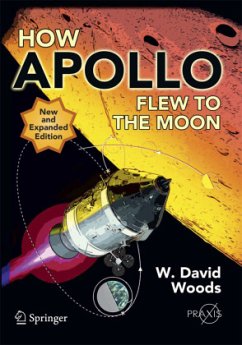Stung by the pioneering space successes of the Soviet Union - in particular, Gagarin being the first man in space, the United States gathered the best of its engineers and set itself the goal of reaching the Moon within a decade. In an expanding 2nd edition of How Apollo Flew to the Moon, David Woods tells the exciting story of how the resulting Apollo flights were conducted by following a virtual flight to the Moon and its exploration of the surface. From launch to splashdown, he hitches a ride in the incredible spaceships that took men to another world, exploring each step of the journey and detailing the enormous range of disciplines, techniques, and procedures the Apollo crews had to master. While describing the tremendous technological accomplishment involved, he adds the human dimension by calling on the testimony of the people who were there at the time. He provides a wealth of fascinating and accessible material: the role of the powerful Saturn V, the reasoning behind trajectories, the day-to-day concerns of human and spacecraft health between two worlds, the exploration of the lunar surface and the sheer daring involved in traveling to the Moon and the mid-twentieth century. Given the tremendous success of the original edition of How Apollo Flew to the Moon, the second edition will have a new chapter on surface activities, inspired by reader's comment on Amazon.com. There will also be additional detail in the existing chapters to incorporate all the feedback from the original edition, and will include larger illustrations.
From the reviews of the second edition:
"This book was written for those ... to learn without the prerequisite degree in aeronautics. ... Due to the high level of detail that is paid to virtually all aspects of Apollo, this book is well worth the price and should be considered a must have for space aficionados. ... There are additional stories of Apollo's engineering triumphs both on the surface of the Moon as well as in flight, much of which reflects my continuing journey into the technical achievement that was Apollo." (Jason Rhian, Aviation Week, March, 2011)
"How Apollo Flew to the Moon is the consummate technical narrative about the Apollo lunar program for the nontechnical reader. ... for those who have a long-held interest in the Apollo program and always wondered how things worked this is a treasure trove. ... is not only a fun and accessible tech-read but also a very valuable reference book, where you will find detail and minutia that is difficult to find anywhere else. ... no comparable work which is so accessible or rewarding to read." (Rod Pyle, Quest, Vol. 19 (3), 2012)
"This book was written for those ... to learn without the prerequisite degree in aeronautics. ... Due to the high level of detail that is paid to virtually all aspects of Apollo, this book is well worth the price and should be considered a must have for space aficionados. ... There are additional stories of Apollo's engineering triumphs both on the surface of the Moon as well as in flight, much of which reflects my continuing journey into the technical achievement that was Apollo." (Jason Rhian, Aviation Week, March, 2011)
"How Apollo Flew to the Moon is the consummate technical narrative about the Apollo lunar program for the nontechnical reader. ... for those who have a long-held interest in the Apollo program and always wondered how things worked this is a treasure trove. ... is not only a fun and accessible tech-read but also a very valuable reference book, where you will find detail and minutia that is difficult to find anywhere else. ... no comparable work which is so accessible or rewarding to read." (Rod Pyle, Quest, Vol. 19 (3), 2012)



